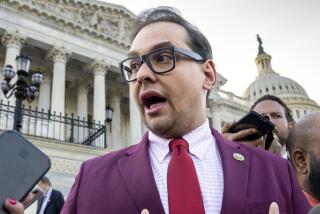Rostenkowski Easily Wins Bid to Stay in House
- Share via
CHICAGO — Overcoming allegations of corruption with the aid of President Clinton and a rejuvenated city Democratic machine, Rep. Dan Rostenkowski (D-Ill.), powerful chairman of the House Ways and Means Committee, easily won renomination Tuesday night after the toughest race in his long political career.
The controversial congressman defeated four challengers in the Democratic primary, virtually assuring his reelection in the heavily Democratic 5th Congressional District.
With 87% of the ballots in the district counted, Rostenkowski had 50% of the vote. His chief rival, State Sen. John J. Cullerton, had 31%. Former Chicago alderman Dick Simpson had 14%.
“Politics is not a profession that rewards purity or perfection,” Rostenkowski said as he claimed victory. “I’ve made mistakes. I hope I’ll learn from them and do better in the future.”
Even so, Rostenkowski indicated that the grueling 1994 campaign may be his last hurrah. When a supporter shouted “four more years,” he responded: “I don’t know about four but I know about two!”
The chairman pledged that he would go back to Washington and help the President enact a health care program to cover every American. He won the primary despite a two-year-old federal grand jury investigation centering on allegations that he converted $22,000 in postage stamps from accounts of his office to cash for personal use. The inquiry is in its “final stages,” according to the U.S. attorney in Washington.
If he is indicted, the 35-year House veteran would have to step down as chairman of Ways and Means, the panel that will play a major role in welfare as well as health care reform legislation.
Rostenkowski, 66, waged a come-from-behind campaign that brought him back almost from the political grave a month ago.
Low turnout and a massive show of electoral force by an estimated 6,000 loyal Democratic precinct workers mobilized by Chicago Mayor Richard M. Daley and remnants of the still-powerful Democratic organization here helped Rostenkowski survive.
Rostenkowski credited Clinton’s campaign visit at a “pivotal moment” two weeks ago with sparking a comeback in a race that was considered too close to call even on election eve.
Cullerton, a 45-year-old attorney with 15 years of experience in the state Legislature, conceded defeat Tuesday night.
Alderman Bernard Hansen, a Cullerton adviser, said that a turnout of 55% of the district’s voters would have been needed to achieve an upset victory over Rostenkowski.
“Simpson’s the spoiler,” Hansen told a reporter, referring to the candidate who ran third in the five-way contest.
But Rostenkowski was winning more votes than both Cullerton and Simpson. Two other candidates trailed badly.
Bill Banks, an alderman and leader of the 36th ward on the Northwest side of the city that helped ensure Rostenkowski’s victory, said that he had more than 1,000 precinct workers making sure that supporters of the Ways and Means chairman went to the polls. Rostenkowski carried every precinct in his ward except one, Banks said.
The jubilant winner, who clearly disliked his campaign role, said that he would be working hard even for those voters who did not support him. But he gave much of the credit to Clinton, who risked criticism for virtually endorsing Rostenkowski while he was under suspicion of corruption.
“I’m proud to be a soldier in the President’s march for change,” he said. “I hope to help President Clinton write a (health care) bill that will help people who need the help.
“I’m a public servant who is pleased that the voters have renewed his contract.”
In a plea bargain, former House Postmaster Robert Rota pleaded guilty last year to corruption charges, citing “Congressman A” as a member of the House who had been part of a scheme to convert stamps to cash. It was clear from Rota’s description, that Rostenkowski was intended to be Congressman A.
Rostenkowski has denied wrongdoing. The investigation is reported to have been expanded to include possible “ghost” employees, who were paid but did not work, and misuse of office funds.
More to Read
Get the L.A. Times Politics newsletter
Deeply reported insights into legislation, politics and policy from Sacramento, Washington and beyond. In your inbox twice per week.
You may occasionally receive promotional content from the Los Angeles Times.










